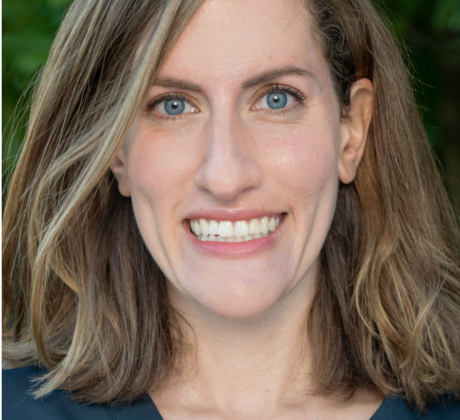Stephanie Ostroff is a speech-language pathologist and journalist. She enjoys blending knowledge from both fields to shine a light on innovators and changemakers in health care.


Andrea Cooke, MHCI ‘22, expanded her own perspective so she could expand health care access for others.
Andrea Cooke knows what it means to pivot.
For the past seven years, every time health care policy flip flopped or emerged overnight out of reshuffled priorities in Washington, she sprang into action the next morning.
As Director of Regulatory and Legislative Policy at the Blue Cross and Blue Shield Association (BCBSA), Cooke served as translator between Capitol Hill and the 34 Blue companies, interpreting shifts in federal legislation and their implications on the one-third of Americans covered by their plans. From her desk in D.C., Cooke had a bird’s eye view of both the payer and the policy side of health care. In 2020, she looked to Penn to widen that perspective and prepare for her next pivot, enrolling in the Master of Health Care Innovation.
Cooke, who already held an MBA from Howard University, “wanted a new view, a new way to look at things…to be able to talk to different stakeholders that are not Blue or influenced specifically, directly by Blue, and be able to talk to people from different parts of the country.” She appreciated that the MHCI was composed of faculty and students from a mix of backgrounds. “We have consultants, we have people in the pharmacy industry, in the behavioral health industry, medical practice. So that actually allowed me to get different viewpoints,” she added.
This program actually gave me a door into insight that I didn’t have, but I had people that I could call.
Diverse Perspectives During a Pandemic
As she began the Master’s program, Cooke faced a series of complex pandemic-induced health policy shifts; the vaccine rollout and sudden ubiquity of telehealth services demanded a robust understanding of all sides of the system. When she showed up to class online, Cooke was able to step outside of her wheelhouse and tap into the collective knowledge of her colleagues.
“I would talk to many of the people who were on the clinical side and ask them specifically what they were doing in their office,” Cooke explains. “How would they have discussions with their patients about getting the vaccine? What worked, what didn’t work?” Later, these conversations informed her advocacy work on the Hill.
One of the unique challenges Cooke encountered during the pandemic was developing new reimbursement codes for services as they came into existence. Telehealth was a question mark for insurance companies.
“When a clinician is getting reimbursed, you have to know how much time they spend,” explains Cooke. “How long are they spending on a patient even though it’s virtual, versus in-the-office?” Fortunately, her classmates included providers from specialties as varied as obstetrics and gynecology and radiology. Cooke says she valued the opportunity to hear directly from practitioners about the resources that go into telehealth.
“This program actually gave me a door into insight that I didn’t have, but I had people that I could call on,” Cooke says. “And that was like, perfect timing.”
Cooke’s enrollment in the MHCI synced up seamlessly with her work on the policy side of BCBSA’s National Health Equity Strategy, a data-driven, cross-departmental initiative that aims to reduce racial health disparities, particularly in maternal care, behavioral health, and vaccination. As she met with stakeholders and drafted a white paper in anticipation of the program’s launch in 2021, Cooke drew inspiration from guest speakers, discussion boards, and assignments. She says she was particularly influenced by courses on health care operations and health equity, as well as The American Health Care System, a foundational course taught by Ezekiel J. Emanuel, MD, PhD that led to her co-authoring an op-ed in the Boston Globe her first semester.
What I do influences those families, and I want their ability to survive– whether it’s COVID, diabetes, or cancer– I want to make that journey better for them. I want to help them have the ability to access care and get rid of those barriers.
Inside View of the Health Care System
But Cooke also had personal insight on the health care system. She was in the thick of it, all too familiar with its shortcomings as she managed long-term and end-of-life care for her mother while completing her degree. Cooke brought along her laptop on visits, logging into class and answering emails as she coordinated her mother’s services. It was a tall order even for someone well-versed in the system, she says, and with the luxury of remote work.
Ultimately, Cooke lost her mother and five other family members in the span of two years, including cousins and a nephew who passed away from COVID before vaccines were available.
“I think [going through that] made me understand that…this is real people. This is real lives,” says Cooke. “So what I do influences those families, and I want their ability to survive– whether it’s COVID, diabetes, or cancer– I want to make that journey better for them. I want to help them have the ability to access care and get rid of those barriers.”

